

For some coaches, Jones’ record since he took over as England boss two seasons ago of played 20, won 19, would be reason to pause for a while to admire their handiwork. It is a victory march that includes two Six Nations titles – the first a Grand Slam – as well as an unbeaten record against Southern Hemisphere opposition. It features an unprecedented 3-0 tour whitewash of Australia last summer, and a 2-0 series win in Argentina this summer.
Does it hit the sweet spot with Jones? No chance. The sole defeat by Ireland in March still rankles, and the England coach was not for pausing as he unveiled his first training squad of the season at Twickenham on Friday. Instead, he was focused on breaking new ground whether in fitness, or building unrivalled strength-in-depth.
No sooner had Jones acknowledged that there was little separating the Lions and New Zealand in terms of fitness during the recent drawn series than he was exhorting his England players to take inspiration from Bannister’s achievement in 1954 at Iffley Road.
When I asked him how much his England squad could improve in terms of strength and conditioning Jones said: “We can be 20 per cent fitter.”
A supplementary question about him having any concerns that the wheels might fall off if he pushed the players too hard saw him invoke Bannister. “Not at all. No one knows how hard you can go. Roger Bannister runs the four-minute mile, next year eight people run it. When Bannister ran the four-minute mile all the medical texts said that the body would disintegrate. Seriously. Now you’ve got 20 Americans every year who run a sub four-minute mile. So no one knows how far you can push the body, and that’s why we (in the England coaching group) are so aggressive in looking at other sports.”
Jones said that he and his coaching staff are continually searching for improvement, and looking to bring in expertise in specialist areas if and when necessary.
“We have had Steve Borthwick on the Lions tour, Paul Gustard has been down to Melbourne Storm in the NRL, and the Auckland Blues, to see how we can improve our defence. Our strength and conditioning staff have been to see the bobsleigh and hockey. Our logistics staff have been to visit Formula One and the Tour de France.”
He added: “This week our staff met a guy called Jim Radcliffe who is a strength and conditioning coach with Oregon University. He’s got nine athletes in the World Championships. He is an expert in leg power. If you know anything about college football, Oregon play it faster than anyone else. They train differently, and have a coach named Chip Kelly – they have a very similar philosophy to how we train, and it was very interesting picking his brains to see what we could learn.”
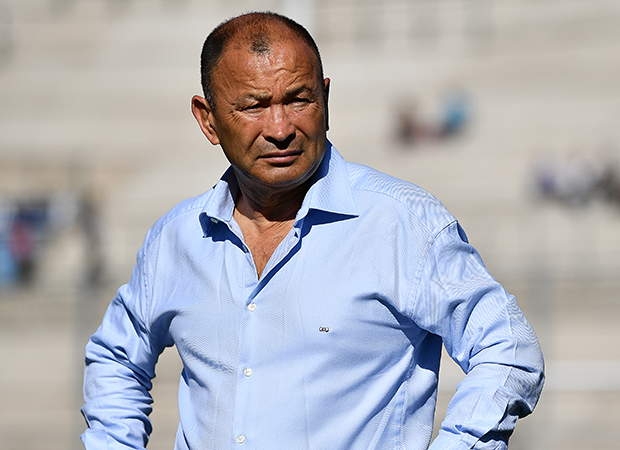
He observed: “Their mindset is that they will put up with anything to get the job done. They stay in 2/3 star hotels like when you used to go on excursions when you were 15 – there’s a bed, a tiny toilet, and nowhere to put stuff. You look at rugby and realise how lucky the players are. We stay in nice hotels, and give them nice food all the time, and therefore we don’t know what they can do.”
He says that this is not because Rugby Union is soft by comparison, but simply because it is uncharted territory. “The impression I get is that we don’t know how far we can go. That’s the exciting thing for me – and we intend to find out.”
There is a temptation to treat this mission statement about being the fittest team in the world with a degree of scepticism because coaches tend to reach for it every time there is a new four-year World Cup cycle. Jones’ predecessor Stuart Lancaster was a case in point in the build-up to the 2015 tournament, even though England looked short of a gallop throughout it.
However, Jones has earned the right to be taken seriously precisely because of the rapid conditioning gains the England players have made during his tenure – and he is not slow in pointing them out.
“Just look at 2015 and what happened in the last 20 minutes with England against Wales and Australia (in the World Cup) – the (combined) scoreline in the last 20 minutes was 18-3 (against England). Then we play Australia in 2016 at the end of ten months of rugby – and some of the guys haven’t had a break since the previous May – and we beat them three nil. The score in the last 20 minutes (in the three Tests against the Wallabies) was 25-3. That’s how you can change a team – and we can change them again. We can go to another level again. We can, and we will.”
Jones uses Usain Bolt’s groundbreaking achievements in sprinting to drive his message home. “No one thought they could do what he does. You run the 100m, 200m and 4×10…if you are young guy growing up, a sprinter, what do you see your goals being? You want to be in the 100, 200 and 4×100. As soon as you open up the mental capacity to think you can do it, you open up the physical capacity to do it.”
He says there were signs of England putting the theory into practice this summer. “We were in the twenties (in terms of points scored) in the last 20 minutes in the two Tests against Argentina, who had been playing Super Rugby, so they had the advantage of playing fast rugby all the time. We had guys coming off ten months of club rugby where it is this (bashes his fist), and in five weeks we are able to change the way the team played. It is definitely do-able.”
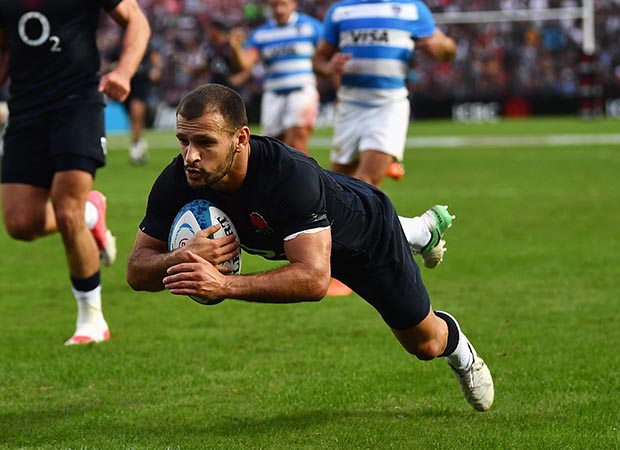
The head coach said that the other area in which England are making significant headway is in the strength of the squad. Jones said before the tour of Argentina that if he returned with two new players capable of making the World Cup squad of 31 – which he says he will know by the end of this season – he would be satisfied.
However, when I asked him how many he had found he said England had more in the player bank than he anticipated. “We have potentially found five or even six that could get in the squad. I couldn’t have been more pleased with the tour because we were able to unfold that new talent, and at the same time win the Tests in a good style of rugby. I was really pleased with the new guys, and the older guys. Launchbury, Hartley, Hughes, Robshaw, Care, above, Brown and Ford were all outstanding.”
Although Jones declined to name the new contenders, judging by his end of tour comments the likely lads are mainly forwards, with Bath lock Charlie Ewels, Exeter tight-head Harry Williams, Leicester loose-head Ellis Genge, Newcastle back rower Mark Wilson, and young openside flankers Tom Curry and Sam Underhill leading the charge.
Jones said of the two No.7s, “Underhill and Curry are definitely Test players in the making. They have a range of skills, a range of toughness, to set them up to play Test rugby.”
He also indicated that young backs Nathan Earle and Harry Mallinder, who did not get much game time against the Pumas, were still on his radar, saying, “we are going to watch very closely to see how they develop”.
Jones was more guarded in his appraisal of England’s 15 Lions, ten of whom saw Test action either as starters or off the bench. “Some guys promoted themselves, some demoted themselves. The guys who demoted themselves have got a lot of work to do, and that’s going to come out in the wash.”
Jones was reluctant to name names, although he commented: “Some of our players did really well and contributed significantly. If you look at the line-out, with Steve Borthwick as coach, and Maro Itoje and George Kruis calling the lineouts in the three Tests, that’s a stand-out area.”
He added a significant footnote on England’s Lions wingers: “Some developed, grew, stood up and loved the big stage. That’s so important in a World Cup. I’ll name one: Anthony Watson. He went there probably as a borderline selection and ended as one of the best wingers for the Lions, and probably one of the best wingers in the series. Now his challenge is to keep that going, and prove he can be one of the best wingers in the world.”
Jones also gave Elliot Daly the thumbs up. “He showed he can definitely be a good left winger, and I’ve always said he can be a good full-back – and he can definitely be a good 13. So he’s lucky he’s got three tables he can throw his dice on.”
The gambling analogy fits well with a 2019 World Cup strategy in which ‘Fast Eddie’ appears to be well on the way to the full house of super-fit Test players he believes is a pre-requisite to success.


International Rugby
Henry Slade pulls out of England’s tour of Argentina and the USA through injury

British and Irish Lions
British and Irish Lions told: Beware Australian dirty tricks

International Rugby
George Ford joins 100 club in England victory over Argentina

















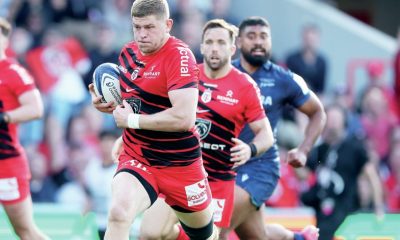

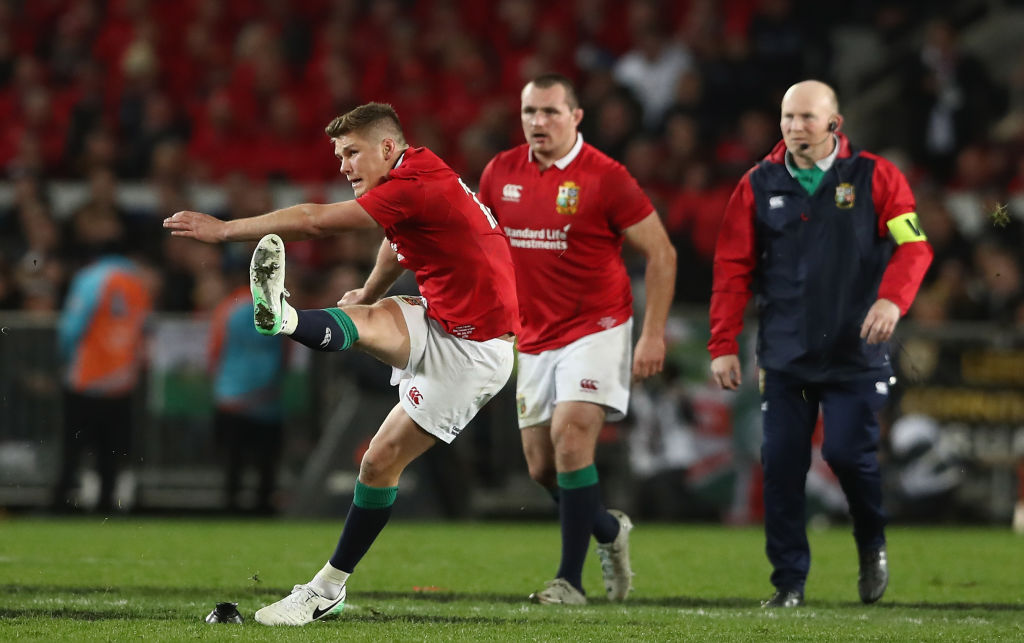
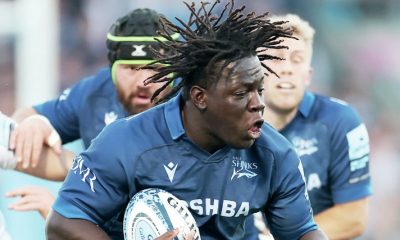

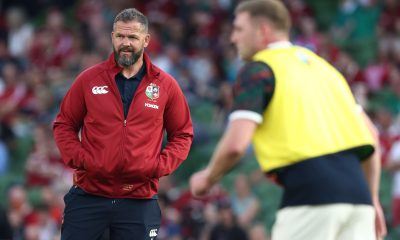



You must be logged in to post a comment Login